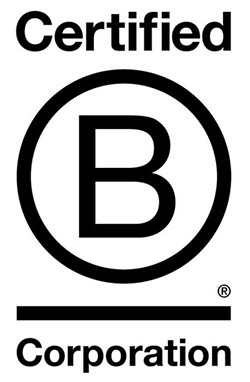Are B Corps as Beneficial as They Claim?
Know Logo helps you navigate today’s greenwashed marketplace, one eco-label at a time. Next up: B Corp.
Certified B Corps plying their wares at Toronto’s B Inspired festival in 2017
In 2007, a cohort of 82 companies was certified as the first generation of Benefit Corporations, or B Corps. Today, over 3,500 companies in 70 countries — ranging from Kickstarter to Patagonia — have earned the certification. B Lab, the global non-profit that certifies B Corps, aims to inspire a cultural shift in the way corporations behave.
“Our vision is of an inclusive, equitable and regenerative economic system for all people and the planet,” B Lab’s website explains. The founders — three friends who’d worked in business and private equity — were concerned about companies prioritizing the value of their stocks over ethical and environmental concerns.
B Lab’s certification process aims to assess how a company’s business model and operations impact workers, community, environment, and customers, rather than shareholder earnings. B Corps run the gamut from sole proprietorships to publicly traded multinationals like Ben and Jerry’s and Danone North America.
“[B Lab] provides a holistic evaluation,” says Todd Schifeling, an assistant professor of strategic management at Temple University’s business school in Philadelphia. “They evaluate across issues, which is appealing to audiences. And it really simplifies things, as opposed to adding up 50 different certifications.”
What’s B Lab?
B Lab encourages companies to adopt a “triple bottom-line” model that considers people and the planet alongside profit. Its B Impact Assessment evaluates how a company treats its employees, people living in communities where it operates, the environment, and the way their financial structure affects the community. Companies can access the assessment for free to see how they stack up against certified B Corps.
How do companies get certified?
Companies must achieve a minimum score on the B Impact Assessment, meet legal requirements set out by B Labs, have their impact assessment verified, and pay B Lab a certification fee. The assessment standards are set by B Labs’ Standards Advisory Council, which is made up of academics and business experts, including professors, representatives of large companies like Patagonia and the Walgreens Boots Alliance, and members of the financial industry.

The impact assessment includes about 200 questions focused on day-to-day operations and the company’s business model, which fall into five areas. Under the governance category, the assessment considers the impact of policies and practices, such as whether a company’s mission statement includes environmental and social commitments and how it enables employees to act ethically. Second, the assessment measures worker well-being through metrics like the percentage of full-time employees paid a living wage, and the type of health-care benefits employees receive. Third, the assessment considers a company’s contributions to the community through factors like the number of living wage jobs created, and whether the company performs an environmental and social impact audit of suppliers.
Considerations related to environmental impact include greenhouse gas emissions reduced and offset, green building standards, and water conservation. Finally, customer impact is measured by things like whether the company offers warranties, how it handles customer data, and how it responds to customer feedback. The assessment also includes questions related to supply chain, potentially sensitive industries like mining and prisons, and legal issues that could affect a company’s eligibility to become a B Corp.
Over 3,500 companies in 70 countries — ranging from Kickstarter to Patagonia — have are B Corp certified.
Companies receive a score out of 200 on their social and environmental performance. To become a B Corp, they must score at least 80. Businesses must also amend their legal governing documents to require that directors balance shareholder interests with those of other stakeholders, including employees, suppliers, society, and the environment.
B Lab analysts evaluate the impact assessments and any changes to companies’ legal structures. It’s unclear how carefully assessments are analyzed. B Lab’s website says the review process takes six to 10 months, but it also says some companies might not need to verify responses with an analyst. B Corps must display their scores on B Lab’s website. Public companies must make their entire B Impact Assessment public, though they can redact sensitive information like revenue. To maintain their certification, B Corp-certified companies must update their assessment every three years and score at least 80 points.
How is B Lab funded?
According to its website, 68% of B Lab’s 2019 operating budget of US$12 million came from “earned income,” including B Corp certification fees, impact measurement services, and event fees and sponsorship. Donations — including contributions from well-known donors like JP Morgan and the Rockefeller Foundation — accounted for the rest. To minimize conflicts of interests, B Lab has made a commitment to balancing revenue streams to avoid over-reliance on one source, and created processes for managing potential conflicts. For example, a company cannot get certified for two years if it donates US$100,000 or more to B Lab.
Why do companies get certified?
B Lab’s website claims B Corp certification helps companies attract employees, earn customer trust, and gain competitive advantages. But the main reason companies go after certification? To show they’re dedicated to being better.
“One major motivation for certification is to fight against other companies’ unverified claims of sustainability and social responsibility,” says Suntae Kim, an assistant professor of management and organization at Boston College. He has studied why companies become B Corps with Temple University’s Schifeling. “Given the rigor, and the hassle, of the certification process — that involves a lot of work, energy, time, money, and potential liability — companies that hope to achieve mere ‘greenwashing’ wouldn’t be able to easily achieve or maintain the certification.”
What does this certification mean?
The B Corp certification provides a holistic assessment of companies’ social and environmental practices. A company can’t have a great environmental record, but treat workers horribly if it wants to be certified. However, B Corps are rated on a scale, so some perform better than others. To see how a particular B Corp scored, find its assessment at on the B Corp website.
“They evaluate the entire company,” says Schifeling. “So it’s not like, ‘this is just our green product line,’ and on the other side of the company, most of our money is coming from crude oil or something like that.”
Given the rigor of the certification process, companies that hope to achieve mere “greenwashing” wouldn’t easily achieve certification.
Plus, Boston College’s Kim says the certification hasn’t been co-opted by big corporations for greenwashing. With other labels — such as organic, fair trade, and socially responsible investment — “efforts to expand the movement led to… the dilution of certification standards,” he says.
B Lab is taking steps to avoid such possibilities, Kim adds, noting it’s put in place a rigorous guideline for multinational corporations which “would certainly make one think that there is no way profit-centered multinationals would want to even consider going through the process.”
Buzzword summary
Rigorous, holistic, and undiluted (so far). An improvement on the status quo.
Print Issue: Spring/Summer 2021
Print Title: In Good Company
